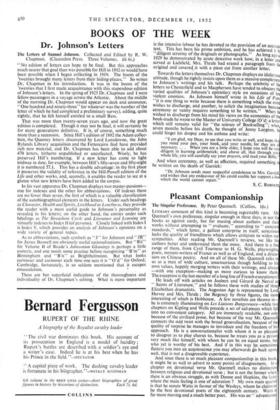BOOKS OF THE WEEK
Dr. Johnson's Letters
"No edition of letters can hope to be final. But this approaches much nearer that goal than was possible for Hill in 1892 or would have been possible when I began collecting in 1919. The boom of the 'twenties brought many letters from their hiding-places." So writes Dr. Chapman in his introduction. It was in the boom of the 'twenties that I first made acquaintance with this stupendous edition of Johnson's letters. In the spring of 1925 Dr. Chapman and I were fellow-passengers in a voyage across the Atlantic. About the middle of the morning Dr. Chapman would appear on deck and announce, "One hundred and ninety-three" (or whatever was the number of the letter of which he had completed a preliminary survey), adding, quite rightly, that he felt himself entitled to a small Bass.
That was more than twenty-seven years ago, and now the great edition is completed. Though it may not be final, it will certainly be for many generations definitive. It is, of course, something much more than a recension. Since Hill's edition of 1892 the Adam collec- tion, the Queeney letters discovered by Lord Lansdowne, the John Rylands Library acquisition and the Fettercairn find have provided rich new material, and Dr. Chapman has been able to add about 470 letters, hitherto unpublished or uncollected. Wisely, he has preserved Hill's numbering. If a new letter has come to light midway in date, for example, between Hill's fifty-seven and fifty-eight it is numbered 57.1. This has a double advantage: in the first place it preserves the validity of reference in the Hill-Powell edition of the Life and other works, and, secondly, it enables the reader to see at a glance what new letters have been added to the corpus.
In his vast apparatus Dr. Chapman displays two master-passions- one for indexes and the other for abbreviations. Of indexes there are no fewer than seven, the first of which is a valuable classification of the autobiographical elements in the letters. Under such headings as Character, Health and Spirits, Livelihood or Loneliness, they provide the reader with a most useful guide to Johnson's personality as revealed in his letters; on the other hand, the entries under such headings as The Streatham Circle and Literature and Learning are virtually indexes to Index [I (of persons). Closely linked with Index I is Index V, which provides an analysis of Johnson's opinions on a wide variety of general topics.
As to abbreviations, such symbols as "J" for Johnson and "J13" for James Boswell are obviously useful rationalisations. But "Rii" for Volume II of Reade's Johnsonian Gleanings is perhaps a little esoteric, and one needs some practice before recognising "B'm" as Birmingham and "B'n" as Brighthelmston. But what looks curiouser and curiouser each time one sees it is "O'd" for Oxford; Cambridge, fortunately, is so seldom mentioned that it escapes emasculation.
These are but superficial indications of the thoroughness and individuality of Dr. Chapman's editing. What is more important is the intensive labour he has devoted to the provision of an accurat text. This has been his prime ambition, and he has achieved it b "diligent scrutiny of the originals or photographs." As long ago a. 1929 he demonstrated by acute detective work how, in a letter pre served at Lichfield, Mrs. Thrale had erased a paragraph from fill original and covered it with a piece cut from another letter.
Towards the letters themselves Dr. Chapman displays no idolatrote attitude, though he rightly insists upon them as a massive complemen, to Johnson's writings and his talk. Perhaps the celebrity of tht letters to Chesterfield and to Macpherson have tended to obscure tilt varied qualities of Johnson's epistolary style on occasions of lea violent emotion. As Johnson himself wrote in his Life of Pope, It is one thing to write because there is something which the mind wishes to discharge, and another, to solicit the imagination because ceremony or vanity requires something to be written." When he wished to discharge from his mind his views on the economics of the book-trade he wrote to the Master of University College [O'd] a letter which still remains valid for "the science of Bookselling"; whe seven months before his death, he thought of Jenny Lagton, could forget his dropsy and his asthma and write: "I am glad, my Dear, to see that you write so well, and hope tha you mind your pen, your book, and your needle, for they are a necessary. . . . When you are a little older, I hope you will be ver diligent in learning arithmetick; and above all,. that through you whole life, you will carefully say your prayers, and read your Bible.'
And when ceremony, as well as affection, required something t be written on the death of Garrick: "Dr. Johnson sends most respectful condolence to Mrs. Garric and wishes that any endeavour of his could enable her support a lo which the world cannot repair."
S. C. ROBERTS


































 Previous page
Previous page